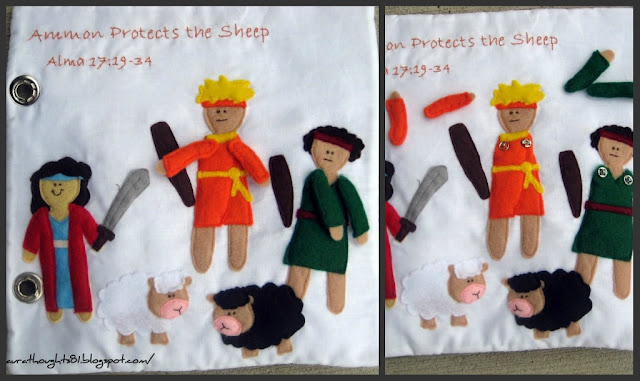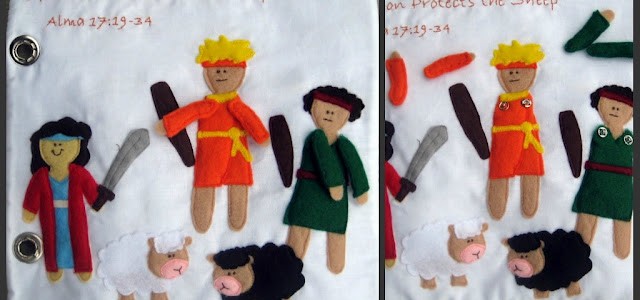Today’s guest post, written by Angela, is based on “Consider Skipping Hunger Games” by James T. Summerhays.
;
 As a book of scripture, The Book of Mormon poses some important and persuasive theories concerning the effects of wickedness, secrecy, and greed on any civilization and clearly demonstrates how a few people’s lust for power can lead to the destruction of a nation.
As a book of scripture, The Book of Mormon poses some important and persuasive theories concerning the effects of wickedness, secrecy, and greed on any civilization and clearly demonstrates how a few people’s lust for power can lead to the destruction of a nation.
The book is a historical depiction of the people who lived on the American continent from 600 BC to 421 AD that focuses on Nephi, Alma, and a number of other prophets as they prepare the way for the coming of Jesus Christ. These disciples of God demonstrate commendable perseverance and bravery as the society descends the slippery slope into moral depravity.
It’s full of fabulous ethical lessons. The problem is that ethics are found in the execution. And the execution of these ethics is a plethora of stories featuring child soldiers and senseless slaughter. This execution-as-ethics problem particularly rings true for readers who are young and more easily influenced. When the parents of 2,000 boys between the ages of 12 and 17 consent to have their children go out and fight an entire army of grown men, a young boy or girl may easily construe the ethical lesson of this as, “It’s okay to abandon your children in a time of war.” The kid naturally internalizes this since mom or dad just gathered the entire family in the living room and read a story that is extremely violent and that plays on a child’s fear of abandonment.
In most cases, young kids are sheltered from stories that depict child extortion, abandonment and excessive violence. Even parents who lack a moral and religious compass, known for letting their kids run around naked, read stories free of senseless slaughter to their own youngsters. What does it mean when the most morally conscious and religious among us give their children copies of The Book of Mormon when they turn eight? What does it mean when parents read this book to preschool aged children and no one says a word against it?
The Book of Mormon is the only scriptural volume of its kind. Nothing else is exactly like it. And while it may not be the only book with prophets who kill or with children who are forced to go to war, it is the only book with these kinds of violent stories that’s seen as a wholesome builder of faith. It has been marketed as a clean, decent, family story. And families are reading it together en masse.
In the interest of common decency, please reconsider reading The Book of Mormon to your kids. Reconsider the wisdom of exposing them to this title at such a young age. Below is a list of only a few acts of violence in the book, many against innocent people or those who are unarmed.
- A young prophet cuts off the head of a helpless man, and then steals his property. The man is unconscious and in no position to fight.
- Women and children are burned alive, and two prophets have the power to stretch out their hands and stop it, but let the innocent die for the glory of God.
- A man rises on his arms after he’s been decapitated, and then dies after he struggles for breath. This scene is graphic, gruesome, and disturbing.
- Women in general and daughters in particular are taken captive, deprived of their virtue, tortured to death, and then eaten.
- A servant of the king cuts off the arms of numerous bandits in order to accomplish the two-fold objective of protecting the king’s sheep and sharing the gospel (see the flannel Quiet Book depicted above).

So true!
I think that last line is awesome, Heather. I especially love that you added the flannel Quiet book!
I think I’ll use this little ditty for book club next week when we discuss the Hunger Games.
It is tempting to just consider this witty parody. (And it is—high five Angela). But it is ironically true. Mr. Summerhay’s concern over a violent 2 hour film is one thing. But organizing family and community around a violent foundational text is quite another.
http://www.i4m.com/think/lists/bom_violence.htm
Mitt Romney took a bunch of his grandkids to see the Hunger Games on Saturday at the movie theater a bit south of me, so it must be ok. :)
And, loved the post. One of the more surreal experiences of my life was when I got my teeth cleaned a few years ago, and somehow the hygienist figured out that I was Mormon. She had been raised Mormon, and she started ranting on the violence in the Book of Mormon, especially the story of Laban. I agreed with her, but there’s not much you can add to the discussion while someone’s got your mouth full of dental instruments.
Yes–my little Stuart is quite the little pacifist and he does not like all the violent stories in the scriptures at all. They truly puzzle and disappoint him. Shoot–he’s upset by the mere suggestion that we might kill the gophers that are tearing up our yard. And if he catches wind that GOD is enacting violence on people–especially a whole town or civilization–or that God WANTS someone to kill someone else, well that’s just it for him.
So tempted to post this on my FB wall – it’s.that.good. Sadly, outside of fMh, I don’t think anyone else would get it.
For me, it depends on the story. As a kid, I never had a problem with Nephi killing Laban (especially because he’d tried to kill them first). I also thought the one about the decapitated guy was pretty awesome (I was a bit gruesome as a kid). Now, though, I would not want my kids to get the burning-people-at-the-stake thing, because it seems like the sort of fanaticism that causes so much harm; I also hate the BoM conflation of virginity and virtue. That’s the last thing our children need to hear.
Hey, this has always been my justification for why movies rated R for violence were okay to watch! Lucky for me, I don’t feel like I need any justification for R rated movies anymore…
And very awesome post (slapdown?). Loved it!
Very well posed. From my perspective, your thoughts seem to be very valid but the conclusions are a bit hasty. The common denominator in all of scripture is that these spiritual men have established a real connection with God and they are commanded to do these actions often despite their natural aversions. If we posit that God HAS actually appeared to spiritual men and they are not acting on a blind faith, WE can’t claim to have the greater perspective and know what the correct action was in their situation.
“A young prophet cuts off the head of a helpless man, and then steals his property. The man is unconscious and in no position to fight”
This strikes me as an intentional provocative misrepresentation. Laban’s words and actions condemned himself. He WAS in a position to fight when he tried (unsuccessfully) to murder Nephi and his brothers under the false accusation that THEY were robbers. Laban stole THEIR property. Under Jewish established laws these sins would have been punishable by death if he were honestly tried. That’s not based on God’s secret laws to Nephi, that was the laws of the land. Nephi did not WANT to kill Laban which is telling of the type of character he was. This is the type of person God shows himself to, a man who questions. I personally think there are explanations to these tough questions and the parent is a mediator like they are in all things. there is extra responsibility placed on their shoulders to guide the journey of their children.
As parents we have the ability to search for answers and emphasize certain things and downplay certain things until our children are mature enough to wrestle with the questions themselves and seek understanding. Have any children tried to chop off people’s arms because of the Book of Mormon? Can any holy book address the issue of the value of life, or the consequences of actions, or the reality of evil without accurately depicting war or death? Personally, I would expect it and be more critical if it did NOT address these extremes. I would think it was telling me what I wanted to hear.
The same book includes examples of people, serving the same god, who fall down in front of their enemies and allow themselves to be slaughtered rather than to break an oath against violence. This obviously more closely represents our personal modern sentiments. Couldn’t this be provided as a supplement to the confusing, complicated situation portrayed by Nephi?
The Book of Mormon is not just a compilation of violent, out-dated, irrelevant stories. It shows examples of dozens of people who saw and spoke with God and reveals the steps that got them to that point. If we value the book, that is the message we would take from it. We should try to understand these complicated situations for ourselves. Unfortunately our correlated church discussions are often an obstacle.
I have had the same opinions as this article for several years so I would never say they are invalid, in fact I welcome this kind of challenge because it emphasizes the important issues. If the BOM proves to erode our morals rather than improve them or distance us from God rather than bring us closer to him it SHOULD be discarded.
Okay. The piece was satirical, so its purpose was to entertain and point out the irony of the Meridian article. Angela can speak for herself, however.
You are right that there are many examples of love shown by people in the Book of Mormon.
Also what percentage of Mormons believe in the historical facticity of the BOM as opposed to it having spiritual truth? Obviously what is described has no historical reality but how many see it as parables, myth or symbol? I guess it depends on age but also location? I am doing an academic study so stories of how your views of the historical reality would be appreciated!
My daughters are 11 and 8 and from the very beginning, up to now, as long I have have been reading the BofM to them, I have done serious editing.
I was just doing my VT a couple weeks ago and I was going off about how sick to death of it I was– sick of the violence, strategy and wars and I much prefer MatthewMarkLukeJohn.
The lady I was visiting said, and I was surprised by it, “Read by topic”. I think she is probably right-that would be better. My kids know the overall plot.
I think Pres Benson’s “read the Book of Maaarmon 30 min a day” has always made me feel bad because it just really isn’t my favorite book. But, I’m thinking about skipping it altogether after the May Ensign comes out. We’ll do conference talks as ‘scripture study’ for awhile until I can get back into a better head space.